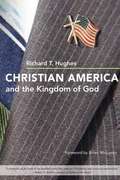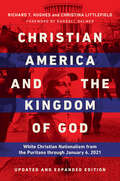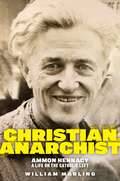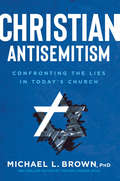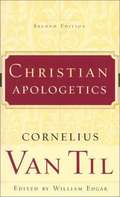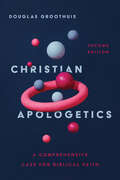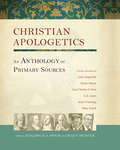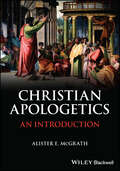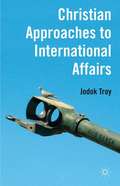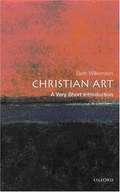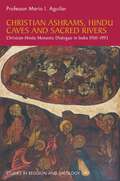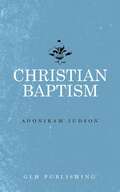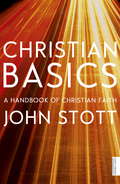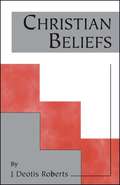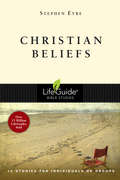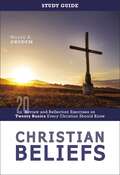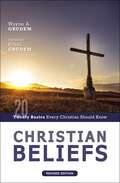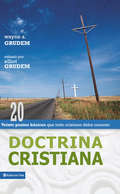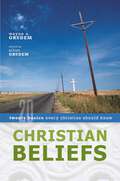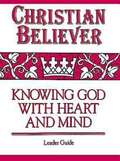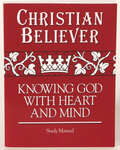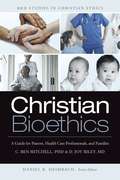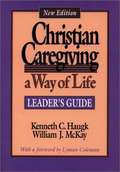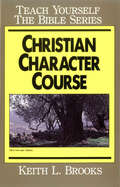- Table View
- List View
Christian America and the Kingdom of God
by Richard T. HughesThe idea of the United States as a Christian nation is a powerful, seductive, and potentially destructive theme in American life, culture, and politics. Many fundamentalist and evangelical leaders routinely promote this notion, and millions of Americans simply assume the Christian character of the United States. And yet, as Richard T. Hughes reveals in this powerful book, the biblical vision of the "kingdom of God" stands at odds with the values and actions of an American empire that sanctions war instead of peace, promotes dominance and oppression instead of reconciliation, and exalts wealth and power instead of justice for the poor and needy. With conviction and careful consideration, Hughes reviews the myth of Christian America from its earliest history in the founding of the republic to the present day. Extensively analyzing the Old and New Testaments, Hughes provides a solid, scripturally-based explanation of the kingdom of God--a kingdom defined by love, peace, patience, and generosity. Throughout American history, however, this concept has been appropriated by religious and political leaders and distorted into a messianic nationalism that champions the United States as God's "chosen nation" and bears little resemblance to the teachings of Jesus. Pointing to a systemic biblical and theological illiteracy running rampant in the United States, Hughes investigates the reasons why so many Americans think of the United States as a Christian nation despite the Constitution's outright prohibition against establishing any national religion by law or coercion. He traces the development of fundamentalist Christianity throughout American history, noting especially the increased power and widespread influence of fundamentalism at the dawn of the twenty-first century, embodied and enacted by the administration of President George W. Bush and America's reaction to the terrorist attacks on September 11, 2001.
Christian America and the Kingdom of God: White Christian Nationalism from the Puritans through January 6, 2021
by Richard T. Hughes Christina LittlefieldThe myth of a Christian America fuels a powerful political force sure of its moral superiority and intent on implementing a Christian nationalist agenda. Richard T. Hughes and Christina Littlefield draw on discussions of civil religion and forms of nationalism to explore the complex legal and cultural arguments for a Christian America. The authors also provide an in-depth examination of the Bible’s words on the “chosen nation” and “kingdom of God” that Christian nationalists quote to support the idea of the US as a Christian nation. A timely new edition of the acclaimed work, Christian America and the Kingdom of God spotlights how the centuries-long pursuit of a Christian America has bred an aggressive white Christian nationalism that twists faith, unleashes unchristian behavior, and threatens the nation.
Christian Anarchist: Ammon Hennacy, A Life on the Catholic Left
by William MarlingA biography of a remarkable figure, whose politics prefigured today’s social justice, ecology, and gender equality movements Ammon Hennacy was arrested over thirty times for opposing US entry in World War 1. Later, when he refused to pay taxes that support war, he lost his wife and daughters, and then his job. For protesting the bombing of Hiroshima and Nagasaki, he was hounded by the IRS and driven to migrant labor in the fields of the West. He had a romance with Dorothy Day, founder of the Catholic Worker, who called him a “prophet and a peasant.” He helped the homeless on the Bowery, founded the Joe Hill House of Hospitality in Salt Lake City, and protested the US development of nuclear missiles, becoming in the process one of the most celebrated anarchists of the twentieth century. To our era, when so much “protest” happens on social media, his actual sacrifices seem unworldly. Ammon Hennacy was a forerunner of contemporary progressive thought, and he remains a beacon for challenges that confront the world and especially the US today. In this exceptional biography, William Marling tells the story of this fascinating figure, who remains particularly important for the Catholic Left. In addition to establishing Hennacy as an exemplar of vegetarianism, ecology, and pacificism, Marling illuminates a broader history of political ideas now largely lost: the late nineteenth-century utopian movements, the grassroots socialist movements before World War I, and the antinuclear protests of the 1960s. A nuanced study of when religion and anarchist theory overlap, Christian Anarchist shows how Hennacy’s life at the heart of radical libertarian and anarchist interventions in American politics not only galvanized the public then, but offers us new insight for today.
Christian Antisemitism: Confrontng the Lies in Today's Church
by Michael L. BrownHate isn&’t a thing from history. The Jewish people and Israel have been described as &“a dominant and moving force behind the present and coming evils of our day&”; &“a monstrous system of evil…[that] will destroy us and our children&” if not resisted; and a group that seeks &“the annihilation of almost every Gentile man, woman, and child and the establishment of a satanic Jewish-led global dictatorship.&” What&’s worse is that these comments were all made by professing Christians. In Christian Antisemitism, respected Messianic Bible scholar Michael L. Brown, PhD, documents shocking examples of modern &“Christian&” antisemitism and exposes the lies that support them. Carefully researched, this book shows that church-based antisemitism is no longer a thing of the past. Rather, a dangerous, shocking tide of &“Christian&” antisemitism has begun to rise. In Christian Antisemitism, Dr. Brown shows you how to stem this tide now and overcome the evil of &“Christian&” antisemitism with the powerful love of the cross!This book will show you how to confront everyday antisemitism in all areas of your life and become a champion for the people of Israel.
Christian Apologetics
by Cornelius Van TilThis book originated in Van Til’s seminary syllabus in 1929. This went through many editions and was first published for use outside the classroom as a book by P&R in 1975. Since then, it has become a classic of apologetics theory and practice. In this edition, editor Bill Edgar adds an introduction and explanatory notes.
Christian Apologetics: A Comprehensive Case for Biblical Faith
by Douglas GroothuisPeople are hungry for hope. They want to understand our human condition—its origin, nature, purpose, and destiny. The Christian faith offers hope for individuals and the entire universe, grounded in absolute truth. But how can we know that Christianity is true? And how can Christians confidently present their beliefs in the face of doubts and competing views? In this comprehensive text, Douglas Groothuis makes a clear and rigorous case for Christian theism. Demonstrating how apologetics must be both rational and winsome, he addresses the most common questions and objections people raise regarding Christianity. After laying a foundation with the biblical basis for apologetics, apologetic method, and a defense of objective truth, he presents key arguments for the reality of God, a case for the credibility of Jesus, and evidence for the resurrection. Groothuis also evaluates alternative views and responds to challenges such as religious pluralism and the problem of evil. The second edition of this landmark work has been updated throughout to address current issues and sources. It includes new chapters on topics such as doubt and the hiddenness of God, the atonement, the church, and lament as a Christian apologetic. To know God in Christ, Groothuis argues, means that we desire to make Christian truth available to others in the most compelling form possible. Students, ordinary Christians, and seasoned philosophers will all find a wise guide for this endeavor in Christian Apologetics.
Christian Apologetics: An Anthology of Primary Sources
by Chad V. Meister Khaldoun A. SweisFor the first time in over one hundred years, the significant writings of history’s most notable Christian apologists are available in one ebook. The Anthology of Christian Apologetics seeks to represent a broad Christian spectrum, ranging from those as early as Saint Paul and Saint Augustine, Saint Teresa of Avila and Blaise Pascal, to more recent and present day apologists such as C. S. Lewis, Alvin Plantinga, William Lane Craig, Richard Swinburne, and Pope Benedict XVI. Over fifty entries address key issues in the history of Christian apologetics. Introductions provide general overviews and guides to the topical arrangements of these issues. Photographs of the major apologists enliven the work and concise section headings clearly organize the material. Discussion questions, annotated reading lists, a bibliography, and author and subject indexes contribute to the suitability of this anthology as a textbook or supplemental reader. People interested in Christian thought, history, apologetics, philosophy, theology, or religion will find that the scope and depth of this anthology makes it an authoritative reference for key persons, concepts, issues, and approaches in the history of Christian apologetics.
Christian Apologetics: An Introduction
by Alister E. McGrathProvides an accessible overview of the theory and practice of Christian apologetics, written by one of the leading experts in the field Christian Apologetics is a compact yet comprehensive introduction to the theological discipline devoted to the intellectual defense of the truth of the Christian religion. Assuming no previous knowledge of Christian apologetics, this student-friendly textbook clearly explains the major theoretical and practical aspects of the tradition while exploring its core themes, historical development, and current debates. Using a non-denominational approach, world-renowned Christian scholar Alister E. McGrath engages the ideas of a wide range of representative apologists and explores the ways they have been applied throughout history, and can still be used today. Concise, easy-to-digest chapters gradually build students' knowledge and confidence, moving from basic definitions and concepts to more advanced theory and practical application. Throughout the text, the author engages a variety of cultural concerns about religious belief, illustrates the real-life connection of apologetic studies and ministries in the Church, and offers clear explanations and vigorous defenses of the faith that students can adopt in their own writing and speaking. Introduces the art and science of explaining and commending the Christian faith Presents approaches to apologetics that emphasize the positive appeal of Christianity to the imagination and emotions Covers the major approaches to apologetics, identifies their strengths and weaknesses, and discusses their key representatives Helps readers in ministry and outreach defend Christianity against misunderstandings and misrepresentations Addresses the real-world application of apologetics, including role models, good practice, and established wisdom Features case studies of Christian apologists such as G. K. Chesterton, Dorothy L. Sayers, and Tim Keller Includes study questions, activities, further reading lists, full references, and links to video and audio resources developed by the authorDesigned to meet the needs of teachers looking for a clear and reliable introduction to the field, Christian Apologetics: An Introduction is an excellent textbook for undergraduate and graduate apologetics courses in colleges and seminaries, as well as church courses and study groups across Christian denominations.
Christian Approaches to International Affairs
by Jodok TroyTroy analyses how the understanding of religion in Realism and the English School helps in working towards the greater good in international relations, studying religion within the overall framework of international affairs and the field of peace studies.
Christian Art: A Very Short Introduction
by Beth WilliamsonThis Very Short Introduction decodes the key themes, signs, and symbols found l in Christian art: the Eucharist, the image of the Crucifixion, the Virgin Mary, the Saints, Old and New Testament narrative imagery, and iconography. It also explores the theological and historical background of Christian imagery, from the devotional works of the Medieval and Renaissance periods, to the twenty first century. Williamson uses examples from, among others, Cimabue, Michelangelo, and Rosetti. She concludes by outlining the co-existence in contemporary "post-Christian" culture of the deliberately controversial works of artists such as Andres Serrano and Chris Ofili, alongside the consciously devotional works of those such as Eric Gill and Peter Blake.
Christian Ashrams, Hindu Caves and Sacred Rivers: Christian-Hindu Monastic Dialogue in India 1950-1993
by Mario I. AguilarIn late 20th-century India, Christian-Hindu dialogue was forever transformed following the opening of Shantivanam, the first Christian ashram in the country. Mario I. Aguilar brings together the histories of the five pioneers of Christian-Hindu dialogue and their involvement with the ashram, to explore what they learnt and taught about communion between the two religions, and the wide ranging consequences of their work. The author expertly threads together the lives and friendships between these men, while uncovering the Hindu texts they used and were influenced by, and considers how far some of them became, in their personal practice, Hindu. Ultimately, this book demonstrates the impact of this history on contemporary dialogue between Christians and Hindus, and how both faiths can continue to learn and grow together.
Christian Baptism
by Adoniram JudsonA sermon on Christian baptism, with many quotations from Pedobaptist authors. To which are added a letter to the church in Plymouth, Massachusetts, and an address on the mode of baptizing. This work marks missionary Adoniram Judson's watershed decision to become a Baptist. He uses numerous sources to argue that the mode of baptism should be by immersion and that the recipients should always be individuals who have personally believed in Jesus Christ for salvation.
Christian Basics
by John StottChristianity the world's largest religion: almost a third of the population describe themselves as Christian. Over 2000 years since it first started, no other religion has had such cultural and global impact and millions today claim their lives are completely changed by their decision to be a Christian.But what is a Christian and how do you become one? What do Christians actually believe and how does that impact their everyday life?As an introduction to Christianity or a refresher course in the essentials, Christian Basics is a concise but comprehensive guide.· How to become a Christian· How to grow as a Christian· Belief in God, Jesus and the Holy Spirit· Why church is important· What a Christian life looks like.'At whatever stage of your spiritual journey, I pray that something or other in this little book may help you to grow in the grace and knowledge of our Lord and Saviour Jesus Christ'John Stott
Christian Basics: Basic Christianity (Christian Basics Bible Studies)
by John StottChristianity the world's largest religion: almost a third of the population describe themselves as Christian. Over 2000 years since it first started, no other religion has had such cultural and global impact and millions today claim their lives are completely changed by their decision to be a Christian.But what is a Christian and how do you become one? What do Christians actually believe and how does that impact their everyday life?As an introduction to Christianity or a refresher course in the essentials, Christian Basics is a concise but comprehensive guide.· How to become a Christian· How to grow as a Christian· Belief in God, Jesus and the Holy Spirit· Why church is important· What a Christian life looks like.'At whatever stage of your spiritual journey, I pray that something or other in this little book may help you to grow in the grace and knowledge of our Lord and Saviour Jesus Christ'John Stott
Christian Beliefs
by J. Deotis RobertsThis book is designed for those who desire a basic understanding of Christian life and thought. It can be used for personal and family study and devotion. However, it is most appropriate for instruction in Christian doctrine in a congregational setting.
Christian Beliefs (LifeGuide Bible Studies)
by Stephen EyreChristian beliefs are vital to Christian living. They are the foundation of your relationship with God���and even with others. So . . . what do Christians believe? In this twelve-session LifeGuide Bible Study, Stephen Eyre introduces one by one twelve key tenets of the Christian faith. Here is what you need to know (and tell others!) about God, Christ, the Holy Spirit, human nature, sin, salvation, holiness, the church, mission, revelation and the last things. For over three decades LifeGuide Bible Studies have provided solid biblical content and raised thought-provoking questions���making for a one-of-a-kind Bible study experience for individuals and groups. This series has more than 130 titles on Old and New Testament books, character studies, and topical studies. PDF download with a single-user license; available from InterVarsity Press and other resellers.
Christian Beliefs Study Guide: Review and Reflection Exercises on Twenty Basics Every Christian Should Know
by Wayne A. GrudemThis STUDY GUIDE is a companion resource to Wayne Grudem's Christian Beliefs, revised edition. Not every Christian needs to go to seminary, but there are certain teachings of the Bible that every Christian should know. Whether you're a relatively new believer in Jesus or a mature Christian looking for a better understanding of basics of the faith, the Christian Beliefs Study Guide can help you reflect on and deeply internalize the core teachings of Christianity, when used in conjunction with Christian Beliefs, revised edition (sold separately).This STUDY GUIDE will help you think through important topics like:The Bible and its authority for our livesThe characteristics of GodThe importance of prayerAngels and the reality of spiritual warfareWhat it means that we are created in the image of GodWhat God has done for us in ChristThe purpose of the churchWhat happens when Christ returnsThe biblical understanding of heavenAnd much moreChapter by chapter, this STUDY GUIDE will lead you to examine and reflect on Christian Beliefs, revised edition (sold separately), by providing:Summary: A short summary of the chapter to help remind readers what they read.Key terms: Definitions of important terminology introduced in the chapter.Key quotes: Selection of one or two key quotes from the chapter.Central Scripture Passage: An important biblical passage related to the chapter for reflection or memorization.Content Questions: Questions that reflect on the theological content of the chapter.Practical Application Questions: Questions that help tie the theological content of the chapter to real-life situations.For Further Reading: Lists where to find more information on theological topics in Systematic Theology, second edition, by Wayne Grudem so readers know where to go for a deeper dive into specific subjects they want to know more about.The Christian Beliefs Study Guide is the ideal resource for every Christian who wants a solid foundation for understanding the most basic and essential teachings of the Bible.
Christian Beliefs, Revised Edition: Twenty Basics Every Christian Should Know
by Wayne A. GrudemLearn the Teachings of the Bible that Every Christian Must Know. Now Revised and Updated. Over 300,000 Copies Sold!Not every Christian needs to go to seminary, but there are certain teachings of the Bible that every Christian should know. Whether you're a relatively new believer in Jesus or a mature Christian looking for a better understanding of basics of the faith, Christian Beliefs is for you.This readable guide to twenty basic Christian beliefs condenses Wayne Grudem's award-winning book Systematic Theology, prized by pastors and teachers everywhere. He and his son, pastor Elliot Grudem, have boiled down the essentials of theology for everyday Christians and made them both clear and applicable to life. Each brief chapter concludes with questions for personal review or group discussion.In this revised and updated edition of Christian Beliefs, you will learn about:The Bible and its authority for our livesThe characteristics of GodThe importance of prayerAngels and the reality of spiritual warfareWhat it means that we are created in the image of GodWhat God has done for us in ChristThe purpose of the churchWhat will happen when Christ returnsThe biblical understanding of heavenAnd much moreChristian Beliefs is the ideal book for every Christian who wants a solid foundation for understanding the most basic and essential teachings of the Bible.
Christian Beliefs: Twenty Basics Every Christian Should Know
by Wayne Grudem Elliot GrudemGod doesn't call every Christian to go off to seminary, but there are certain matters of doctrine--that is, the church's teaching--that every Christian simply must know. Theology is important because what we believe affects how we live. If you're a relatively new believer in Jesus, or if you're a more mature Christian looking for a quick brush-up on basics of the faith, Christian Beliefs is for you. This readable guide to twenty basic Christian beliefs is a condensation of Wayne Grudem's award-winning book on systematic theology, prized by pastors and teachers everywhere. He and his son, Elliot, have boiled down the essentials of Christian theology for the average layperson and made them both clear and applicable to life. You will learn about the Bible, the characteristics of God, what it means that we are created in the image of God, what God has done for us in Christ, the purpose of the church, and much more. Each chapter includes questions for personal review or group discussion. These truly are twenty basic beliefs that every Christian should know.
Christian Beliefs: Twenty Basics Every Christian Should Know
by Wayne Grudem Elliot GrudemGod doesn't call every Christian to go off to seminary, but there are certain matters of doctrine--that is, the church's teaching--that every Christian simply must know. Theology is important because what we believe affects how we live. If you're a relatively new believer in Jesus, or if you're a more mature Christian looking for a quick brush-up on basics of the faith, Christian Beliefs is for you. This readable guide to twenty basic Christian beliefs is a condensation of Wayne Grudem's award-winning book on systematic theology, prized by pastors and teachers everywhere. He and his son, Elliot, have boiled down the essentials of Christian theology for the average layperson and made them both clear and applicable to life. You will learn about the Bible, the characteristics of God, what it means that we are created in the image of God, what God has done for us in Christ, the purpose of the church, and much more. Each chapter includes questions for personal review or group discussion. These truly are twenty basic beliefs that every Christian should know.
Christian Believer Leader Guide: Knowing God with Heart and Mind (Disciple Ser.)
by VariousThe leader guide provides two kinds of information: (1) suggestions for weekly group sessions; (2) information to enhance leadership skills, to support group building and maintenance, and to make effective use of the CHRISTIAN BELIEVER components.A one-page session plan for each of the thirty weeks follows a set procedure with an amount of time indicated for each step. Each session plan provides guidance for group activities that make use of the daily preparation members have made, and questions for discussion. Group activities are designed to focus on content and help persons connect Scripture, doctrine, believing, and living.The leader guide assumes that: The leader makes the same preparation for the weekly group session as the other members of the group. Study and discussion in the weekly session is done mainly in small groups. The leader both guides the process and participates with other group members in the small-group study and discussion. The leader is not an information-giver or lecturer. The leader and the group members have access to the same content for study and discussion—the assigned Scripture, selections from the book of Readings, the study manual, and the video presentations. A study of CHRISTIAN BELIEVER can renew lives and congregations.
Christian Believer Study Manual: Knowing God with Heart and Mind (Disciple Ser.)
by J. Ellsworth KalasThe study manual guides daily reading in Scripture and in the Book of Readings. It encourages daily prayer while providing space for taking notes for use in weekly group discussion.Each lesson includes an explanation and commentary on the doctrines being studied, raises questions for reader reflection and written response, and suggests ideas for additional reading and study.The Christian Believer program focuses on classical teachings of the Christian faith—presenting, explaining, and interpreting them in a way that participants can understand, through the use of words, symbols, and hymns. Over a 30-week period, participants will examine the writings of ancient and modern Christian commentators and view video presentations by leading Bible scholars.
Christian Bioethics: A Guide For Pastors, Health Care Professionals, And Families (B&H Studies In Christian Ethics Series)
by C. Ben Mitchell D. Joy RileyLiving in an era of highly technical medicine is comforting and sometimes confusing. How should Christians make life and death decisions? How do we move from an ancient text like the Bible to twenty-first-century questions about organ transplantation, stem-cell research, and human cloning? What kind of care do we owe one another at the end of life? Is euthanasia a Christian option? <P><P> Using a dialogue format, an ethicist and physician talk about how to think about thorny ethical issues. Combining their backgrounds in medicine and theology, they deal with real-life moral questions in an accessible way. C. Ben Mitchell and D. Joy Riley let readers eavesdrop on their conversation about the training of doctors, the interpretation of the Bible, and controversial issues like abortion, assisted-suicide, genetic engineering, and in vitro fertilization. <P><P> The book examines these topics under three general headings: the taking of life, the making of life, and the faking of life. Christian Bioethics is a guidebook for pastors, health care professionals and families—anyone facing difficult decisions about health care.
Christian Caregiving - A Way of Life, Leader's Guide
by Kenneth C. Haugk William J. MckayThis leader's guide makes it easy to build community and train church members in distinctively Christian caring and relating skills.
Christian Character Course- Teach Yourself the Bible Series (Teach Yourself the Bible)
by Keith BrooksThe Teach Yourself the Bible Series is one of the best New Testament studies you will find anywhere. Each book in the series is packed full of valuable questions on individual chapters of the Bible, check-ups to test your grasp of scriptural truths, and usable suggestions for group study.Grow in your knowledge of God through each New Testament book, then go on to study six aspects of Christianity essential for all believers: doctrine, prayer, eternal life, prophecy, Christian character, and Bible study.What does it really mean to be a Christian? Christian Character Course is a look at subjects having to do with Christian ethics and practical Christian service. Study the characteristics of a true believer in this important volume.Strengthen your relationship with the living God with all twenty-five books of the Teach Yourself the Bible Series. Each volume is a timeless, yet practical, study of the Word of God.
